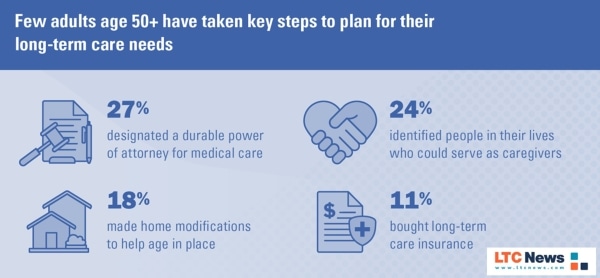More Houston Families Move Aging Parents Home as Extended Care Needs Rise

Houston is aging rapidly. If you live in the Houston area, you are already seeing it. Harris County’s 65+ population has surged 66 percent since 2010, the fastest-growing age group, as more older adults choose to stay and retire in the area. That share remains lower than the national average today, but it is climbing.
Nationally, the population aged 65 and older increased by 9.4 percent from 2020 to 2023 as baby boomers age. Houston is part of that wave and will continue to feel its effects, including an increasing need for long-term care services, over the next decade.
Increased longevity and the large baby boomer generation born from 1946 to 1964 are contributing to the growth in the older adult population. What's particularly remarkable is the near-universal increase in the older population for metro areas across the country. — Lauren Bowers, chief of the Census Bureau’s Population Estimates Branch.
Bowers said the rapid rise in the nation’s older adult population stems from longer life expectancy and the aging of the baby boomer generation, a trend expected to keep driving growth in metro areas nationwide.
Why it matters to you: more older neighbors, more caregiving needs, and more families deciding to move Mom or Dad into their home rather than pay rising facility fees.
How Extended Care Needs Usually Start
Most long-term care begins with small changes, not a single crisis. You notice balance issues. Showers take longer. Medication management gets complicated. Sometimes, these changes are spotted by loved ones who bring in help for them or move them into their own homes.
Unfortunately, the first time loved ones discover there is a problem is when their older parent has a fall. A fall or hospital stay accelerates everything.
- Falls are the leading cause of injury in adults aged 65 and above, according to the CDC. Roughly 1 in 4 older adults falls each year, and fall death rates have climbed sharply through 2023.
- Help with daily living activities (bathing, dressing, toileting, transferring, etc.) becomes the most significant driver of long-term care, not medical procedures.
- Heat has become a bigger local risk. Harris County reported a 329 percent rise in heat-related illness between 2019 and 2023, with older adults among the most vulnerable. As people age, their bodies become less efficient at regulating temperature, and medications or chronic health conditions can make it harder to stay hydrated or recognize the signs of heat stress.
Federal analysts estimate that 56 percent of Americans turning 65 will need some level of long-term services and supports (LTSS). That includes many Houstonians. While many people purchase Long-Term Care Insurance before they retire, many older adults have not, creating a huge physical, emotional, and financial burden on them and their loved ones.
Most Families Haven’t Planned for Long-Term Care
Many people have ignored aging issues and long-term care.
- According to the University of Michigan National Poll on Healthy Aging, many adults have not discussed their care plans with family or healthcare professionals, and a large share report being unsure about how to plan for long-term care.
- Medicare does not cover custodial long-term care. It may cover up to 100 days of skilled nursing after a qualifying hospital stay, but not ongoing help with daily activities at home or in a facility.

Given those realities, and monthly long-term care facility prices that can exceed $5,000 to $9,000 before surcharges, depending on the setting, many Houston families explore bringing a parent home and investing in one-time home modifications.
Why Some Houston Families Move Parents Home
Bringing a parent home is one of the most loving choices you can make, but love alone can’t replace rest, strength, or 24-hour supervision. Even the most devoted adult children and spouses reach a point where care becomes more than one person can manage.
In Texas, more than 3 million family caregivers provide an estimated $41 billion in unpaid care each year. Many also juggle full-time jobs, raising children, or managing their own health. Fatigue builds quietly until it becomes burnout.
However, when you act early, many Houston families discover that bringing an aging parent home before a fall or medical crisis can dramatically improve quality of life and delay the need for full-time professional care.
But success requires an environment built for care, not just good intentions.
The Care Suite: A Practical Blueprint
A ground-floor “care suite” is a bedroom and bathroom zone designed for individuals using wheelchairs, walkers, and requiring hands-on care. It can be a remodel or a small addition.

Think about safety, dignity, and caregiver efficiency.
Bedroom
- Clear 5-foot turning space, target, and bed access on both sides for transfers or a hospital bed later.
- Blocking or structural prep for a ceiling or floor lift.
- Space and outlets for oxygen, suction, or other devices.
Bathroom
- Curbless roll-in shower, handheld shower, even lighting, and non-slip flooring.
- Reinforced walls to add grab bars as needs change.
- Comfort-height toilet and reachable storage.
Circulation and Controls
- Wider doorways with 32 inches clear minimum; 36 inches is easier for wheelchairs and walkers. Hallways widened where feasible.
- Light switches, thermostats, and outlets at reachable heights.
- Nightlights along the bed-to-bath path.
Important note: Federal ADA standards do not apply to private single-family homes, but many families use ADA dimensions as helpful benchmarks for livability.
Choosing the Right Builder—Including Houston Options
Look for contractors with Certified Aging-in-Place Specialist (CAPS) credentials from the National Association of Home Builders. CAPS training covers design details for accessible showers, turning radii, and caregiver workflows, and many CAPS builders partner with occupational therapists.
By partnering with these professionals, including a trusted Houston home builder, you can create an environment that eases the caregiver’s load while allowing older loved ones to remain connected to family and age comfortably in place.
Vetting checklist
- Current CAPS credential and portfolio of curbless showers and widened passages.
- Will coordinate with your occupational therapist, home health agency, or hospice.
- Permitting and inspection plan in writing.
- Materials that are non-slip, cleanable, and quiet.

Share your thoughts and experiences about aging, caregiving, health, retirement, and long-term care with LTC News —Contact LTC News.
When Loving Family Cannot Be Full-Time Care
You can love your parent dearly and still need help. Most caregivers in America are unpaid family members, and the load is heavy. Sixty-three million Americans provide unpaid care. In Texas alone, about 3.1 million family caregivers provide an estimated $41 billion in unpaid care each year.
That is why, even in a multigenerational home, families often hire daytime help for bathing, transfers, meal preparation, or supervision while adult children are at work, as their older loved one requires that attention.
You can search for in-home caregivers and long-term care facilities by using the LTC News Caregiver Directory. The directory has the largest database of long-term care providers in the United States.
Your options:
- Home-care aides, a few hours a day, to cover bathing and medication reminders.
- Adult day services for socialization and supervision.
- Respite grants or coaching through local agencies.
Start locally with the Houston-Galveston Area Agency on Aging and the Harris County Area Agency on Aging Caregiver Support Network. They can guide you to resources, benefits counseling, and respite options.
Budgeting: Compare One-Time Build to Monthly Forever
Discuss with older parents about their thoughts on aging. Ask them if they own Long-Term Care Insurance. If they have an LTC policy that will give them many options, it will reduce the burden on the rest of the family.
Note: LTC News partners with Amada Senior Care to provide free claim support for anyone with a Long-Term Care Insurance policy with no cost or obligation— File a Long-Term Care Insurance Claim.
If they do not have an LTC policy, it might not be too late. While most people acquire Long-Term Care Insurance between the ages of 47 and 67, there are many options available, and they may qualify.
Seek help from an experienced licensed Long-Term Care Insurance specialist. Avoid general insurance agents and financial advisors who have limited experience and a narrow range of options.
Depending on your parents’ situation, you might consider moving them into your home, even if they’re still relatively independent. A practical first step is to compare the one-time cost of building a care suite with the ongoing monthly expenses of assisted living, memory care, or in-home caregiver services in your area.
- Use the LTC News Cost of Care Calculator for the Houston metro as your baseline.
- Remember that Medicare covers short skilled stays after a qualifying hospital admission, but does not pay for ongoing custodial long-term care.
Learn More: Medicare Falls Short on Long-Term Care: Families Face Financial Strain
Think About Your Plan
You see your parents getting older. The ideal time to plan is before a crisis happens. There are various affordable long-term care solutions available.
Start your research with the LTC News Education Center.


